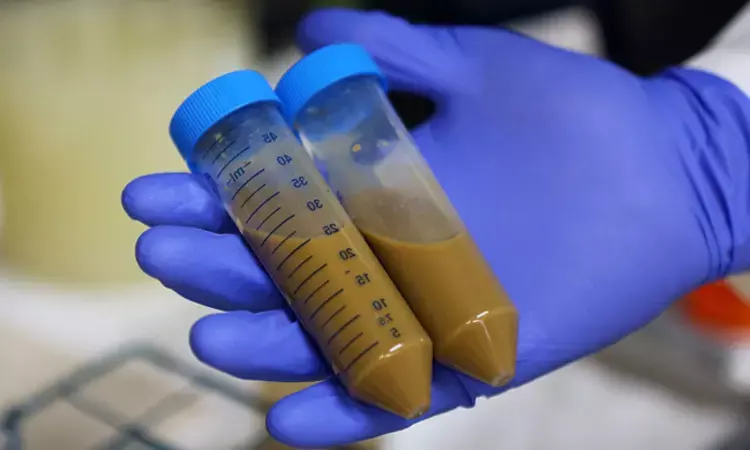- Home
- Medical news & Guidelines
- Anesthesiology
- Cardiology and CTVS
- Critical Care
- Dentistry
- Dermatology
- Diabetes and Endocrinology
- ENT
- Gastroenterology
- Medicine
- Nephrology
- Neurology
- Obstretics-Gynaecology
- Oncology
- Ophthalmology
- Orthopaedics
- Pediatrics-Neonatology
- Psychiatry
- Pulmonology
- Radiology
- Surgery
- Urology
- Laboratory Medicine
- Diet
- Nursing
- Paramedical
- Physiotherapy
- Health news
- Fact Check
- Bone Health Fact Check
- Brain Health Fact Check
- Cancer Related Fact Check
- Child Care Fact Check
- Dental and oral health fact check
- Diabetes and metabolic health fact check
- Diet and Nutrition Fact Check
- Eye and ENT Care Fact Check
- Fitness fact check
- Gut health fact check
- Heart health fact check
- Kidney health fact check
- Medical education fact check
- Men's health fact check
- Respiratory fact check
- Skin and hair care fact check
- Vaccine and Immunization fact check
- Women's health fact check
- AYUSH
- State News
- Andaman and Nicobar Islands
- Andhra Pradesh
- Arunachal Pradesh
- Assam
- Bihar
- Chandigarh
- Chattisgarh
- Dadra and Nagar Haveli
- Daman and Diu
- Delhi
- Goa
- Gujarat
- Haryana
- Himachal Pradesh
- Jammu & Kashmir
- Jharkhand
- Karnataka
- Kerala
- Ladakh
- Lakshadweep
- Madhya Pradesh
- Maharashtra
- Manipur
- Meghalaya
- Mizoram
- Nagaland
- Odisha
- Puducherry
- Punjab
- Rajasthan
- Sikkim
- Tamil Nadu
- Telangana
- Tripura
- Uttar Pradesh
- Uttrakhand
- West Bengal
- Medical Education
- Industry
Faecal matter transplant beneficial in cirrhosis patients

UK: A recent study has shown that faecal microbiota transplants (FMT) could treat patients with advanced cirrhosis by restoring their gut barrier function and improving the metabolism of the deadly toxin ammonia.
Results from the pilot study, now expanded into a large multisite UK trial, were presented at the International Liver Congress of the European Association for the Study of the Liver (EASL) Congress 2023 held at the Messe Wien Exhibition Congress Centre in Vienna by co-lead Dr Lindsey Ann Edwards, FMT Research Director at King's College London.
The placebo-controlled randomized single-blinded feasibility trial (of 32 patients with advanced cirrhosis involving a faecal microbiota transplant led to engraftment and restoration of gut diversity and reduced ammonia retention in the blood. The landmark trial for the first time showed that FMT modifies the gut microbiota, antimicrobial mucosal immunity, enhancing intestinal barrier function and ammonia metabolism.
Genome sequencing revealed that FMT increased species richness with significant donor engraftment. E. faecalis, and there was a reduction in other harmful species, as were in biomarkers of inflammation; in contrast, there was a rise in markers of gut barrier repair. After one month, ammonia levels in the plasma were lower but higher in the faeces, findings that were further enhanced at three months.
Patients with cirrhosis experience reduced gut bacterial diversity with an overabundance of harmful microbes in their gut microbiome. This imbalance, combined with compromised gut barrier function, allows bacteria to translocate (pass into) the body and a reduced antimicrobial immune response, heightening the risk of mortality and infection.
The authors noted that patients with chronic liver disease are often prescribed antibiotics but are at high risk of multidrug-resistant infections, contributing to the global health crisis of antimicrobial resistance. Therefore, an urgent and unmet need exists to tackle illness and antimicrobial resistance in chronic liver disease.
These initial findings are promising news for patients with chronic liver disease who desperately need alternative treatment options," said Professor Debbie L Shawcross at King's College London, the chief investigator.
The trial included 32 patients with advanced cirrhosis (MELD score, 10 - 16) who received 50 g of license-produced, frozen FMT administered via endoscopy into the jejunum or a placebo in 3:1 randomization. The source of FMT stool was healthy, antibiotic-free, omnivorous individuals to ensure good bacterial diversity.
Modulation of patient microbiomes and inflammatory status were evaluated by collecting still and blood samples at baseline and 7, 30, and 90 days after the study started. Samples were tested for markers of gut barrier integrity, cytokine production, metabolite profiles, and analysis of the faecal proteins (faecal proteomics).
The study revealed the following findings:
- After FMT, faecal proteomics detected 301 proteins composed of 154 of human origin — mainly related to gut barrier protection — and 147 of bacterial origin — mostly enzymes — at days 7, 30, and up to 90. Proteins produced after FMT were shown to enhance the antibacterial response of [gut] cells.
- FMT also reduced plasma ammonia (FMT versus placebo at days 30 and 90).
- Bacterial enzymes involved in denitrification and ammonification were increased in the stool following FMT, particularly aspartate ammonia-lyase, with 17 high-confident peptides also enhanced (FMT vs placebo), and likewise, secretion of urinary Hippurate at day 30 in FMT vs placebo.
- There was a rise in beneficial cytokine production FMT, particularly those in the Th17 family involved in mucosal immunity, inflammation, and fighting infection.
"These significant findings bring a renewed hope for patients grappling with advanced cirrhosis, offering a potential breakthrough in their treatment and survival," the researchers conclude.
Reference:
International Liver Congress (ILC) 2023: Abstract GS-007. Presented June 23, 2023.
Dr Kamal Kant Kohli-MBBS, DTCD- a chest specialist with more than 30 years of practice and a flair for writing clinical articles, Dr Kamal Kant Kohli joined Medical Dialogues as a Chief Editor of Medical News. Besides writing articles, as an editor, he proofreads and verifies all the medical content published on Medical Dialogues including those coming from journals, studies,medical conferences,guidelines etc. Email: drkohli@medicaldialogues.in. Contact no. 011-43720751


